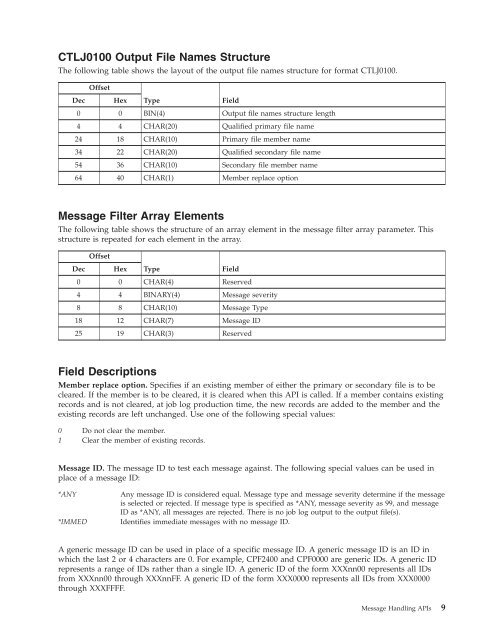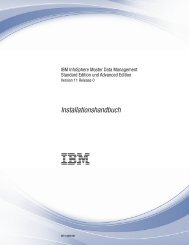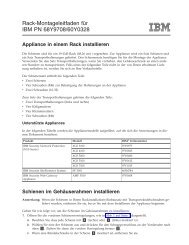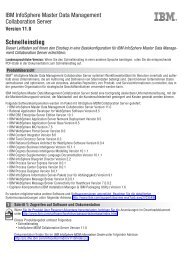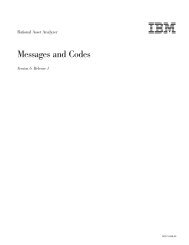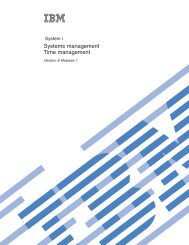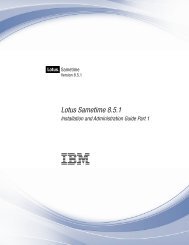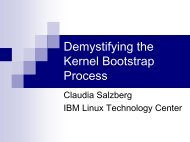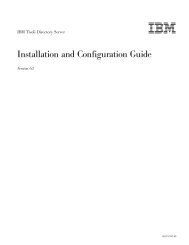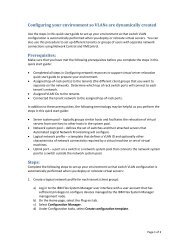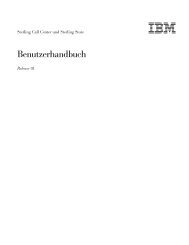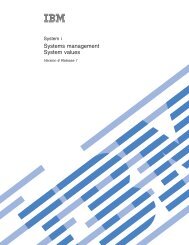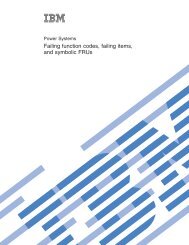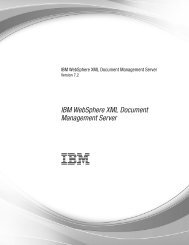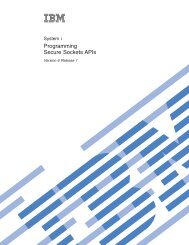System i: Programming Message Handling APIs - IBM
System i: Programming Message Handling APIs - IBM
System i: Programming Message Handling APIs - IBM
Create successful ePaper yourself
Turn your PDF publications into a flip-book with our unique Google optimized e-Paper software.
CTLJ0100 Output File Names Structure<br />
The following table shows the layout of the output file names structure for format CTLJ0100.<br />
Offset<br />
Dec Hex<br />
Type Field<br />
0 0 BIN(4) Output file names structure length<br />
4 4 CHAR(20) Qualified primary file name<br />
24 18 CHAR(10) Primary file member name<br />
34 22 CHAR(20) Qualified secondary file name<br />
54 36 CHAR(10) Secondary file member name<br />
64 40 CHAR(1) Member replace option<br />
<strong>Message</strong> Filter Array Elements<br />
The following table shows the structure of an array element in the message filter array parameter. This<br />
structure is repeated for each element in the array.<br />
Offset<br />
Dec Hex<br />
Type Field<br />
0 0 CHAR(4) Reserved<br />
4 4 BINARY(4) <strong>Message</strong> severity<br />
8 8 CHAR(10) <strong>Message</strong> Type<br />
18 12 CHAR(7) <strong>Message</strong> ID<br />
25 19 CHAR(3) Reserved<br />
Field Descriptions<br />
Member replace option. Specifies if an existing member of either the primary or secondary file is to be<br />
cleared. If the member is to be cleared, it is cleared when this API is called. If a member contains existing<br />
records and is not cleared, at job log production time, the new records are added to the member and the<br />
existing records are left unchanged. Use one of the following special values:<br />
0 Do not clear the member.<br />
1 Clear the member of existing records.<br />
<strong>Message</strong> ID. The message ID to test each message against. The following special values can be used in<br />
place of a message ID:<br />
*ANY Any message ID is considered equal. <strong>Message</strong> type and message severity determine if the message<br />
is selected or rejected. If message type is specified as *ANY, message severity as 99, and message<br />
ID as *ANY, all messages are rejected. There is no job log output to the output file(s).<br />
*IMMED Identifies immediate messages with no message ID.<br />
A generic message ID can be used in place of a specific message ID. A generic message ID is an ID in<br />
which the last 2 or 4 characters are 0. For example, CPF2400 and CPF0000 are generic IDs. A generic ID<br />
represents a range of IDs rather than a single ID. A generic ID of the form XXXnn00 represents all IDs<br />
from XXXnn00 through XXXnnFF. A generic ID of the form XXX0000 represents all IDs from XXX0000<br />
through XXXFFFF.<br />
<strong>Message</strong> <strong>Handling</strong> <strong>APIs</strong> 9


